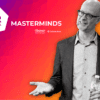
The Journey from Workplace Stress to Healing: Insights from Applied Materials CHRO, Susan J. Schmitt Winchester
today2024.01.25.

WHY SHOULD YOU CARE?
In a time where workplace stress is at an all-time high, Susan J. Schmitt Winchester, CHRO and co-author of “Healing at Work,” offers transformative insights. This article delves into her unique perspective on turning the workplace into a healing environment, challenging traditional views and presenting practical strategies for personal growth and HR innovation. It’s a must-read for anyone seeking to navigate professional challenges with resilience and positivity.

In an era where stress and competitiveness dominate the workplace narrative, Susan J. Schmitt Winchester, Senior Vice President of HR at Applied Materials, and Martha Finney co-authors of the book “Healing at Work,” offer a refreshing perspective. Their insights, particularly relevant in today’s uncertain times, illuminate the path for HR’s evolving role in shaping organizational futures.
At the core of Winchester’s philosophy lies the unconventional notion of the workplace as a healing environment. This concept challenges the traditional view of workplaces being stress-inducers. Instead, Winchester encourages viewing them as platforms for personal and professional growth. In her words, “We don’t typically think of the workplace as a place for healing.” This perspective is especially pertinent as businesses navigate the complexities of the post-COVID crisis and through today’s geopolitical challenges.
Winchester’s journey to this realization wasn’t straightforward. Stemming from personal experiences, she acknowledges the impact of a stressful childhood or family dynamics on professional life.
Many enter their careers with self-limiting beliefs, unwittingly carrying the baggage of their past into the workplace. Winchester candidly shares her struggles with people-pleasing and perfectionism, common responses to such backgrounds.
However, the transformative idea in Winchester’s approach is leveraging workplace conflicts as opportunities for healing. She explains, “Rather than being a place of stress, anxiety, and worry… the workplace can actually be turned into a laboratory for healing.” By recognizing and addressing self-limiting beliefs triggered in professional settings, individuals can embark on what Winchester describes as a transition from an “unconscious career” to a “conscious career.”
“Rather than being a place of stress, anxiety, and worry… the workplace can actually be turned into a laboratory for healing.”
The relevance of this approach is magnified in the context of uncertainty and complexity. As businesses and employees grapple with unprecedented challenges, Winchester’s insights provide a beacon of hope. She advocates for a shift in focus from external validation to internal satisfaction and fulfillment, rooted in one’s values and sense of self-acceptance. This shift is crucial in managing the emotional toll and the post-traumatic stress disorder of the pandemic, which has left many grappling with uncertainty and anxiety.
Winchester also emphasizes the importance of gratitude and positive thinking, especially in trying times. She suggests a conscious choice to focus on positive aspects, whether it’s in adapting to remote work or finding new ways to engage with colleagues. This mindset can transform adversity into an opportunity for growth and innovation.
She recommends several key solutions regarding healing at work:
- Recognizing the Workplace as a Healing Environment: Winchester proposes a paradigm shift in how we perceive our workplaces. Instead of viewing them as sources of stress and competition, she suggests recognizing them as settings where healing and growth can occur. This perspective encourages individuals to see their daily work environment as a place where they can overcome personal challenges and grow, rather than just a source of professional achievement.
- Addressing Self-Limiting Beliefs: Many people enter their careers carrying beliefs and behaviors shaped by their past experiences, especially from childhood. These self-limiting beliefs can manifest as a lack of confidence, fear of failure, or a tendency to undervalue oneself. Winchester emphasizes the importance of identifying and confronting these beliefs. By doing so, individuals can start to untangle how their past impacts their present, opening up possibilities for more fulfilling and authentic professional lives.
- Leveraging Workplace Conflicts: Conflicts in the workplace are often seen as negative, but Winchester views them as opportunities for personal growth and healing. These ‘bumper-car moments,’ as she describes, can trigger self-reflection and a reevaluation of one’s responses and attitudes. By approaching conflicts constructively, individuals can learn to deal with challenges in healthier ways, leading to emotional growth and improved interpersonal skills.
- The transition from an Unconscious to a Conscious Career: This concept involves moving away from a career path driven by external factors — like societal expectations or a quest for external validation — to one driven by internal satisfaction and alignment with personal values. A conscious career is about understanding one’s motivations, recognizing the influence of past experiences, and making deliberate choices that align with one’s true self. It’s about creating a career that not only succeeds externally but feels deeply satisfying and authentic internally.
- Utilizing Positive Thinking and Gratitude: Winchester advocates for a focus on positivity and gratitude, especially during challenging times. This approach doesn’t ignore the realities of difficult situations but instead seeks to find the silver lining. By consciously choosing to focus on the positive aspects of a situation, individuals can maintain a healthier state of mind, reduce stress, and improve their overall outlook on life. This practice can transform the way challenges are perceived and handled, both in personal and professional spheres.
Together, these strategies form a comprehensive approach to finding healing and growth in the workplace. They encourage a deeper understanding of oneself, a more constructive engagement with challenges, and a shift towards a more fulfilling professional life.
Looking at the future of HR, Winchester believes the current crisis presents an opportunity for HR leaders to become architects of change. The pandemic has highlighted the need for HR practices that genuinely add value to organizations and their people. Her advice to HR professionals is to reassess traditional practices and align them more closely with business needs, innovation, and talent development.
As companies navigate the post-pandemic landscape, the lessons from “Healing at Work” could prove transformative. Winchester’s philosophy offers a roadmap for organizations and individuals alike to redefine their approach to work, prioritizing well-being and growth amidst challenges. In a world where the lines between personal and professional life are increasingly blurred, her insights are not just relevant but essential.
Winchester’s journey and insights offer a unique perspective on the role of HR and personal development in the modern workplace. As we adapt to new norms and face ongoing challenges, her approach provides a guiding light for those seeking to find balance, purpose, and healing in their professional lives.
…
Join Susan at The HR Congress WorldSummit in Porto on May 14-15 where she will take the mainstage and hold an exclusive masterclass.

Written by: Mihaly Nagy
Culture Employee Experience HR Strategy Mental Health Wellbeing
Previous post

labelArticles today2024.01.19.
HR Redefined: Steering Through Change with an Outside-In Approach
WHY SHOULD YOU CARE? “Are we there yet?” For HR professionals navigating the ever-changing landscape of modern business, this age-old question takes on a profound new meaning. In a world [...]
Similar posts

labelArticles today2024.10.21.
The success-recipe to build agile and future-ready organizations in 2025 and beyond







Post comments (0)